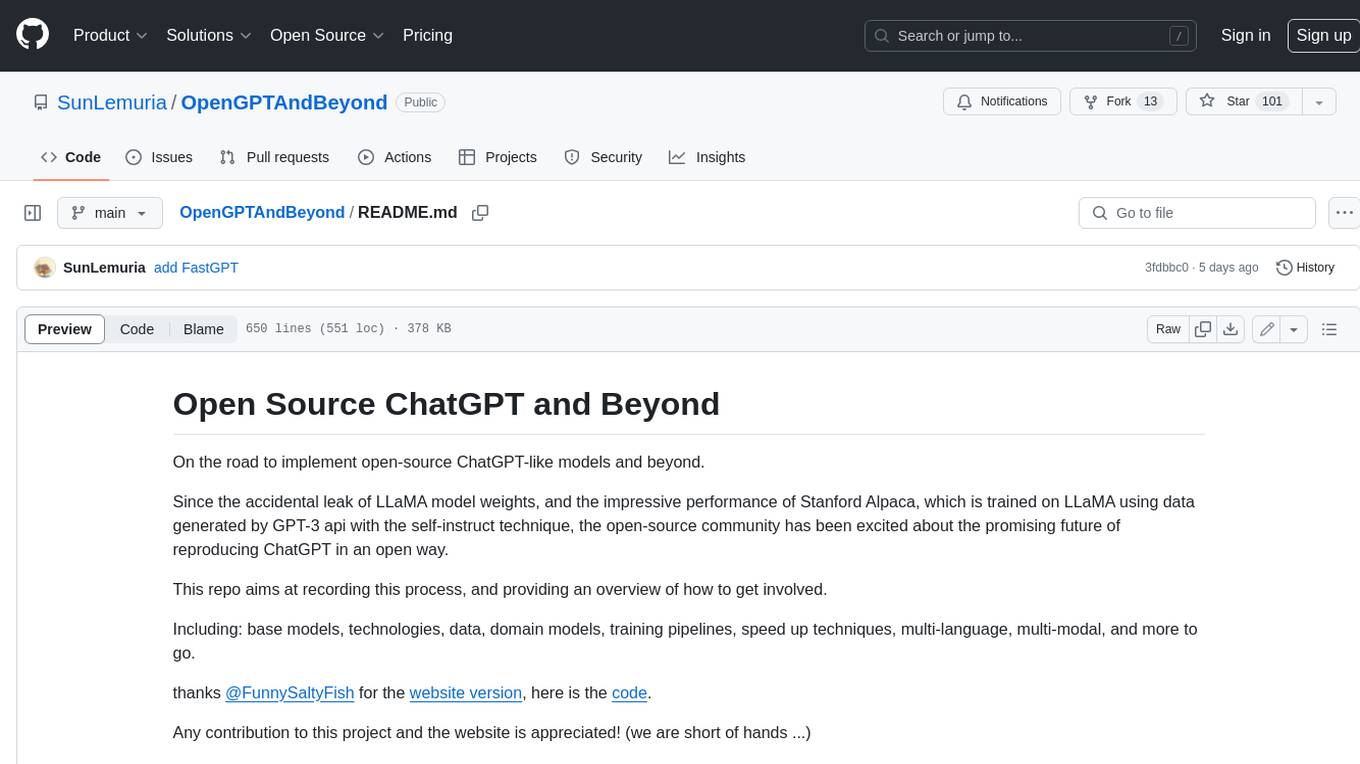
GenAIExamples
Generative AI Examples is a collection of GenAI examples such as ChatQnA, Copilot, which illustrate the pipeline capabilities of the Open Platform for Enterprise AI (OPEA) project.
Stars: 398
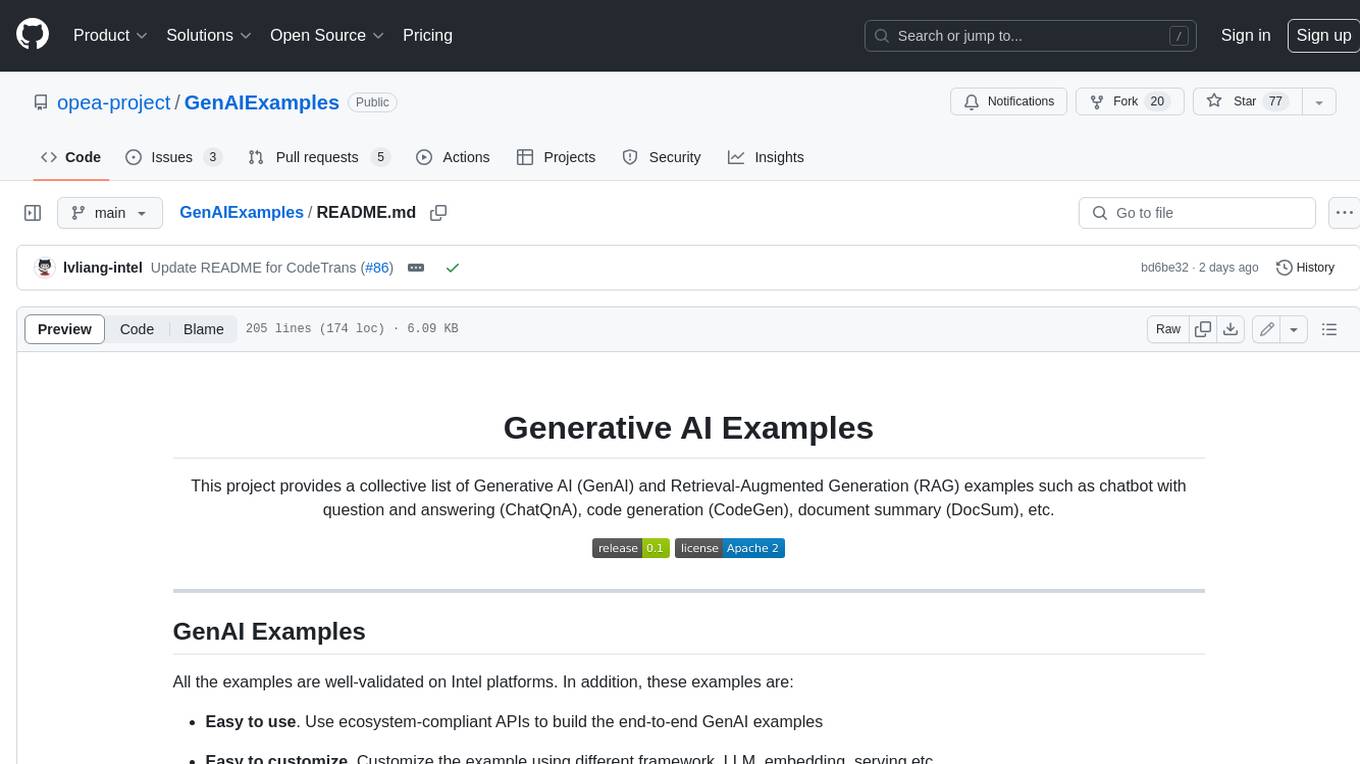
This project provides a collective list of Generative AI (GenAI) and Retrieval-Augmented Generation (RAG) examples such as chatbot with question and answering (ChatQnA), code generation (CodeGen), document summary (DocSum), etc.
README:
GenAIExamples are designed to give developers an easy entry into generative AI, featuring microservice-based samples that simplify the processes of deploying, testing, and scaling GenAI applications. All examples are fully compatible with both Docker and Kubernetes, supporting a wide range of hardware platforms such as Gaudi, Xeon, NVIDIA GPUs, and other hardwares including AMD GPUs, ensuring flexibility and efficiency for your GenAI adoption.
GenAIComps is a service-based tool that includes microservice components such as llm, embedding, reranking, and so on. Using these components, various examples in GenAIExample can be constructed including ChatQnA, DocSum, etc.
GenAIInfra is part of the OPEA containerization and cloud-native suite and enables quick and efficient deployment of GenAIExamples in the cloud.
GenAIEval measures service performance metrics such as throughput, latency, and accuracy for GenAIExamples. This feature helps users compare performance across various hardware configurations easily.
Below are some highlighted GenAI use cases across various application scenarios:
| Scenario | Use Case |
|---|---|
| Question Answering |
ChatQnA ✨: Chatbot with Retrieval Augmented Generation (RAG). VisualQnA ✨: Visual Question-answering. |
| Image Generation | Text2Image ✨: Text-to-image generation. |
| Content Summarization | DocSum: Document Summarization Application. |
| Code Generation | CodeGen: Gen-AI Powered Code Generator. |
| Information Retrieval | DocIndexRetriever: Document Retrieval with Retrieval Augmented Generation (RAG). |
| Fine-tuning | InstructionTuning: Application of Instruction Tuning. |
For the full list of the available use cases and their supported deployment type, please refer here.
The GenAIExamples documentation contains a comprehensive guide on all available examples including architecture, deployment guides, and more. Information on GenAIComps, GenAIInfra, and GenAIEval can also be found there.
GenAIExamples offers flexible deployment options that cater to different user needs, enabling efficient use and deployment in various environments. Three primary methods are presently used to do this: Python startup, Docker Compose, and Kubernetes.
Users can choose the most suitable approach based on ease of setup, scalability needs, and the environment in which they are operating.
Deployment is based on released docker images by default - check docker image list for detailed information. You can also build your own images following instructions.
-
For Docker Compose-based deployment, you should have docker compose installed. Refer to docker compose install for more information.
-
For Kubernetes-based deployment, you can use Helm or GMC-based deployment.
- You should have a kubernetes cluster ready for use. If not, you can refer to k8s install to deploy one.
- (Optional) You should have Helm (version >= 3.15) installed if you want to deploy with Helm Charts. Refer to the Helm Installation Guide for more information.
- (Optional) You should have GMC installed to your kubernetes cluster if you want to try with GMC. Refer to GMC install for more information.
-
Recommended Hardware Reference
Based on different deployment model sizes and performance requirements, you may choose different hardware platforms or cloud instances. Here are some of the reference platforms:
Use Case Deployment model Reference Configuration Hardware access/instances Xeon Intel/neural-chat-7b-v3-3 64 vCPUs, 365 GB disk 100 GB RAM, and Ubuntu 24.04 visit the [Intel Tiber Developer Cloud]. Gaudi Intel/neural-chat-7b-v3-3 1 or 2 Gaudi Card, 16vCPUs, 365 GB disk 100 GB RAM, and Ubuntu 24.04 visit the [Intel Tiber Developer Cloud]. Xeon Intel/neural-chat-7b-v3-3 64 vCPUs, 100 GB disk 64 GB RAM, and Ubuntu 24.04 AWS Cloud/c7i.16xlarge
Note: Check for sample guides first for your use case. If it is not available, then refer to the table below:
Check here for detailed information of supported examples, models, hardwares, etc.
Welcome to the OPEA open-source community! We are thrilled to have you here and excited about the potential contributions you can bring to the OPEA platform. Whether you are fixing bugs, adding new GenAI components, improving documentation, or sharing your unique use cases, your contributions are invaluable.
Together, we can make OPEA the go-to platform for enterprise AI solutions. Let's work together to push the boundaries of what's possible and create a future where AI is accessible, efficient, and impactful for everyone.
Please check the Contributing guidelines for a detailed guide on how to contribute a GenAI component and all the ways you can contribute!
Thank you for being a part of this journey. We can't wait to see what we can achieve together!
For Tasks:
Click tags to check more tools for each tasksFor Jobs:
Alternative AI tools for GenAIExamples
Similar Open Source Tools

GenAIExamples
This project provides a collective list of Generative AI (GenAI) and Retrieval-Augmented Generation (RAG) examples such as chatbot with question and answering (ChatQnA), code generation (CodeGen), document summary (DocSum), etc.
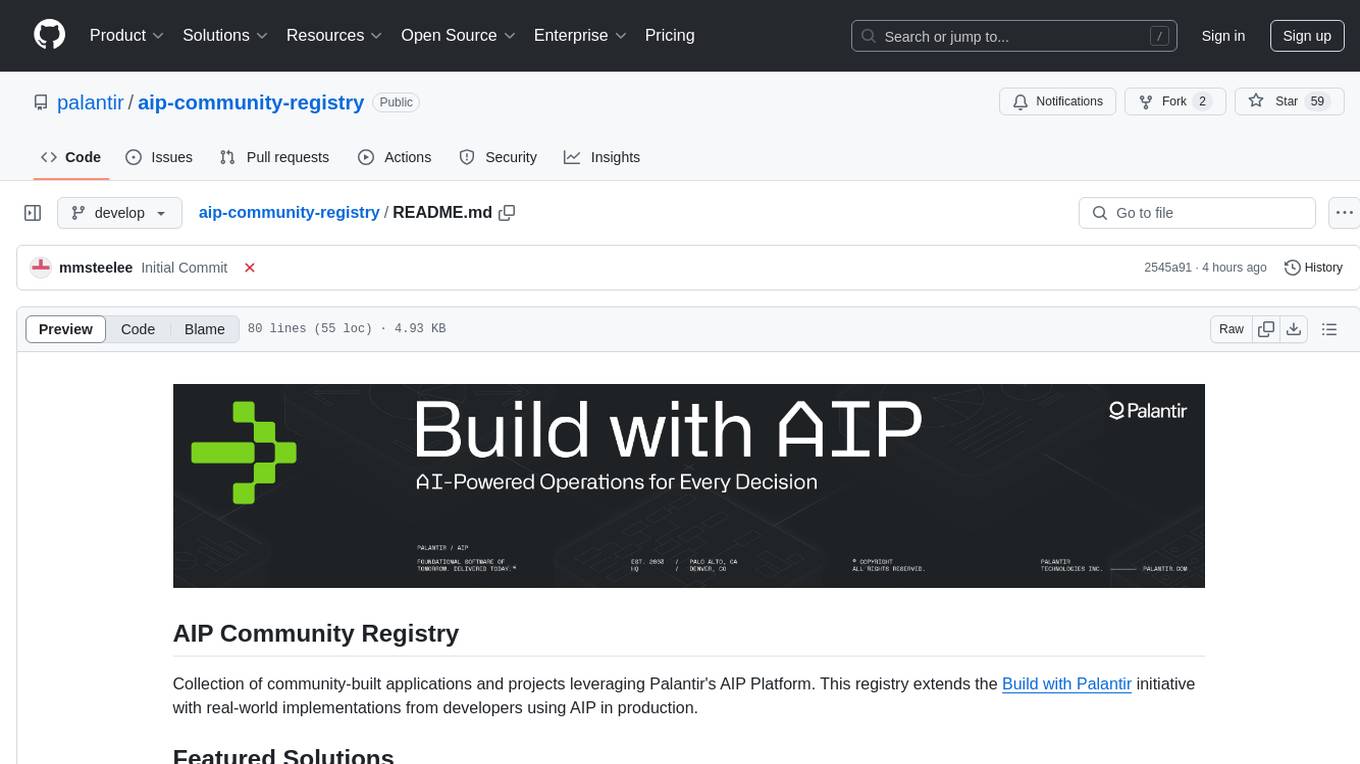
aip-community-registry
AIP Community Registry is a collection of community-built applications and projects leveraging Palantir's AIP Platform. It showcases real-world implementations from developers using AIP in production. The registry features various solutions demonstrating practical implementations and integration patterns across different use cases.

free-for-life
A massive list including a huge amount of products and services that are completely free! ⭐ Star on GitHub • 🤝 Contribute # Table of Contents * APIs, Data & ML * Artificial Intelligence * BaaS * Code Editors * Code Generation * DNS * Databases * Design & UI * Domains * Email * Font * For Students * Forms * Linux Distributions * Messaging & Streaming * PaaS * Payments & Billing * SSL
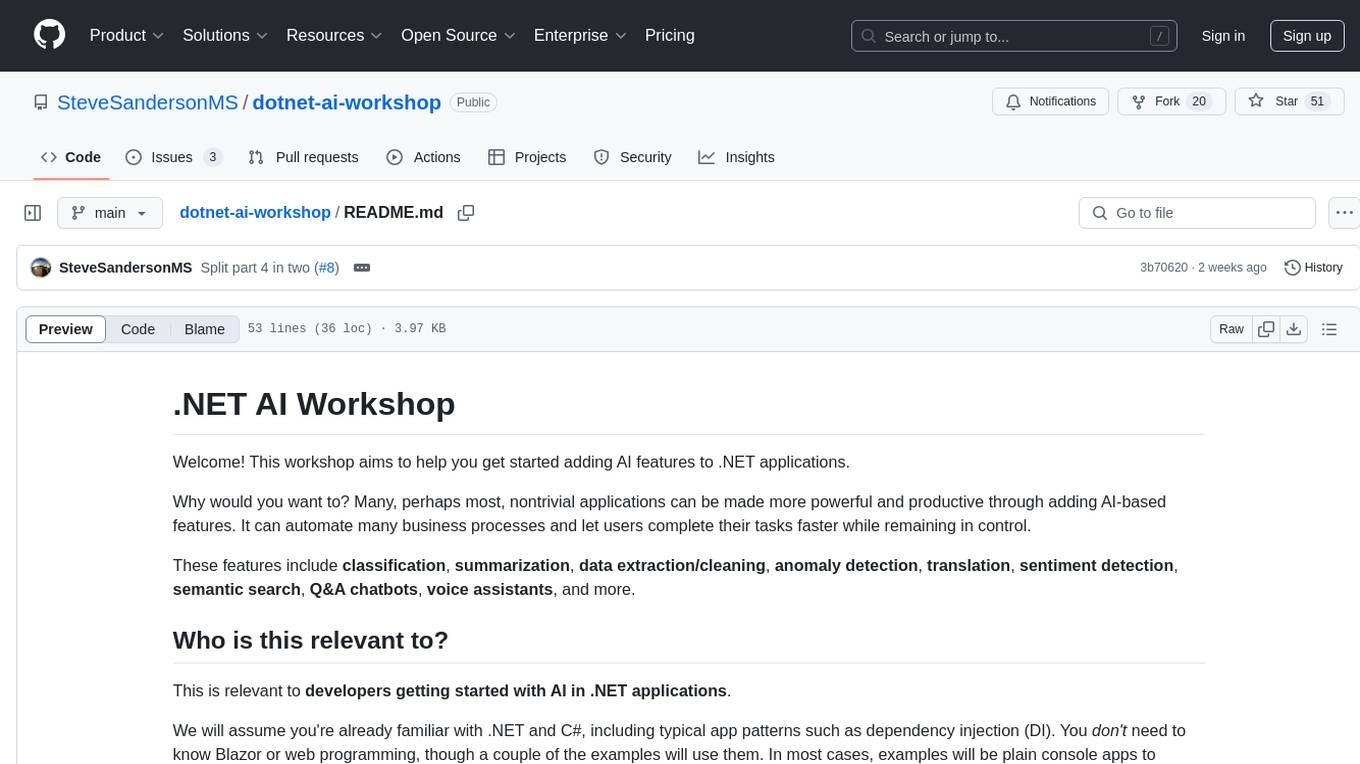
dotnet-ai-workshop
The .NET AI Workshop is a comprehensive guide designed to help developers add AI features to .NET applications. It covers various AI-based features such as classification, summarization, data extraction/cleaning, anomaly detection, translation, sentiment detection, semantic search, Q&A chatbots, and voice assistants. The workshop is tailored for developers new to AI in .NET applications, focusing on the usage of AI services without the need for prior AI technology knowledge. It provides examples using .NET and C# with a focus on AI topics, aiming to enhance productivity and automation in applications.
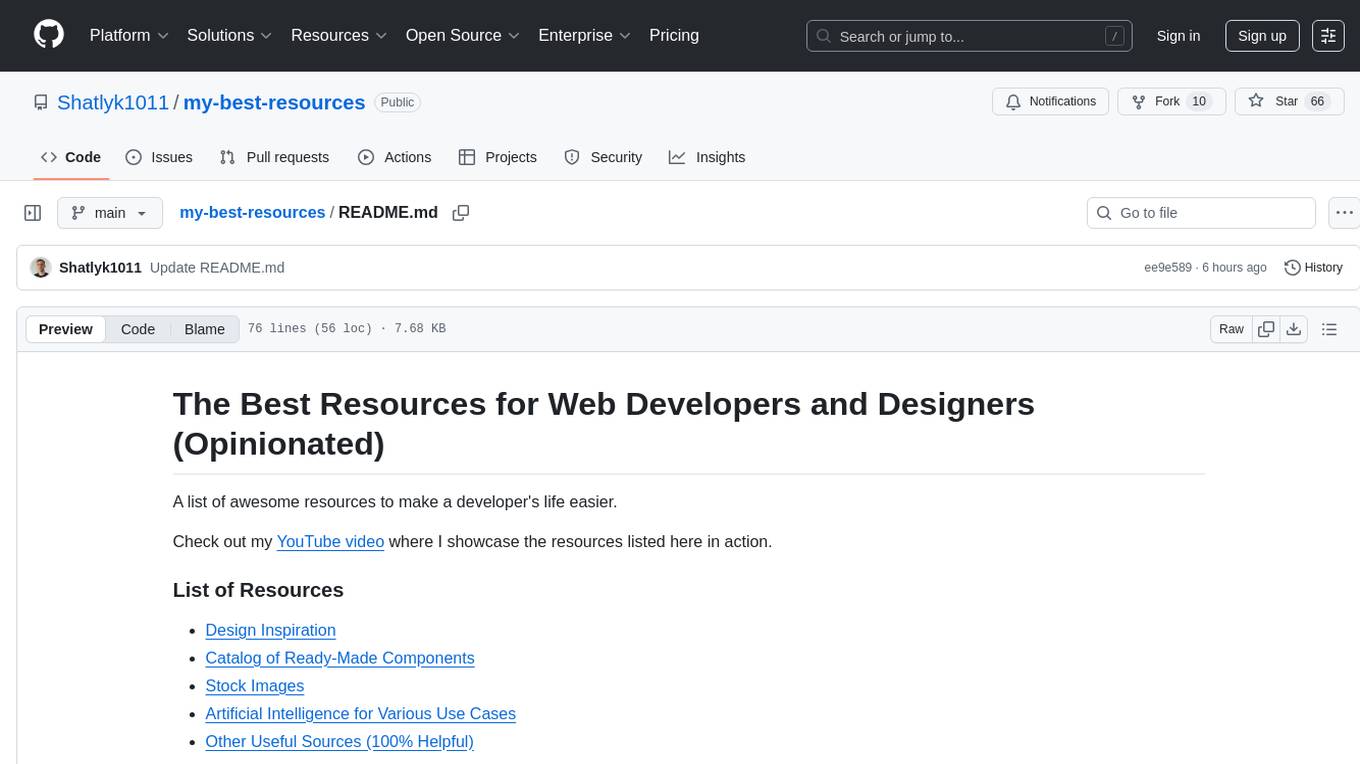
my-best-resources
my-best-resources is a curated list of resources for web developers and designers, aimed at making their lives easier. It includes sections on design inspiration, ready-made components, stock images, artificial intelligence tools for various use cases, and other useful sources. The repository provides links and descriptions for each resource, offering a valuable collection of tools and assets for web development and design projects.
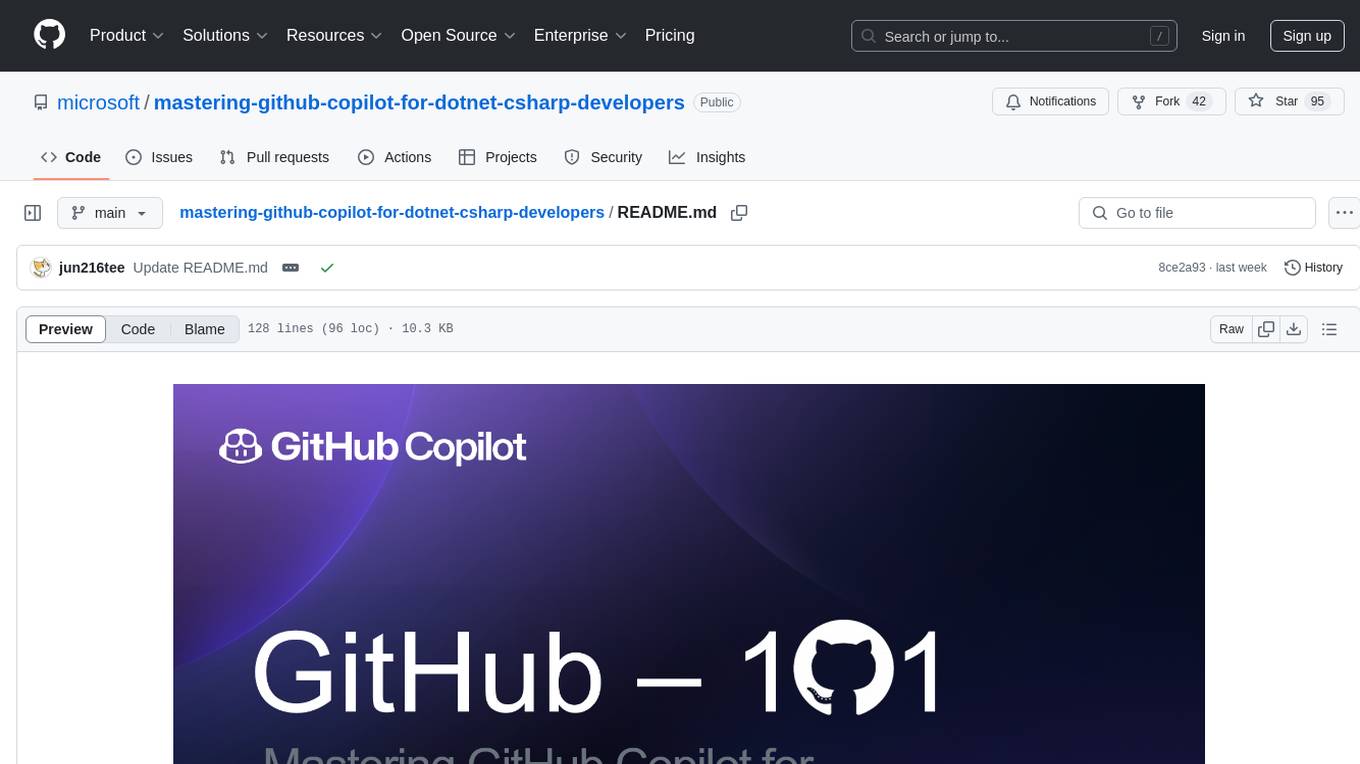
mastering-github-copilot-for-dotnet-csharp-developers
Enhance coding efficiency with expert-led GitHub Copilot course for C#/.NET developers. Learn to integrate AI-powered coding assistance, automate testing, and boost collaboration using Visual Studio Code and Copilot Chat. From autocompletion to unit testing, cover essential techniques for cleaner, faster, smarter code.
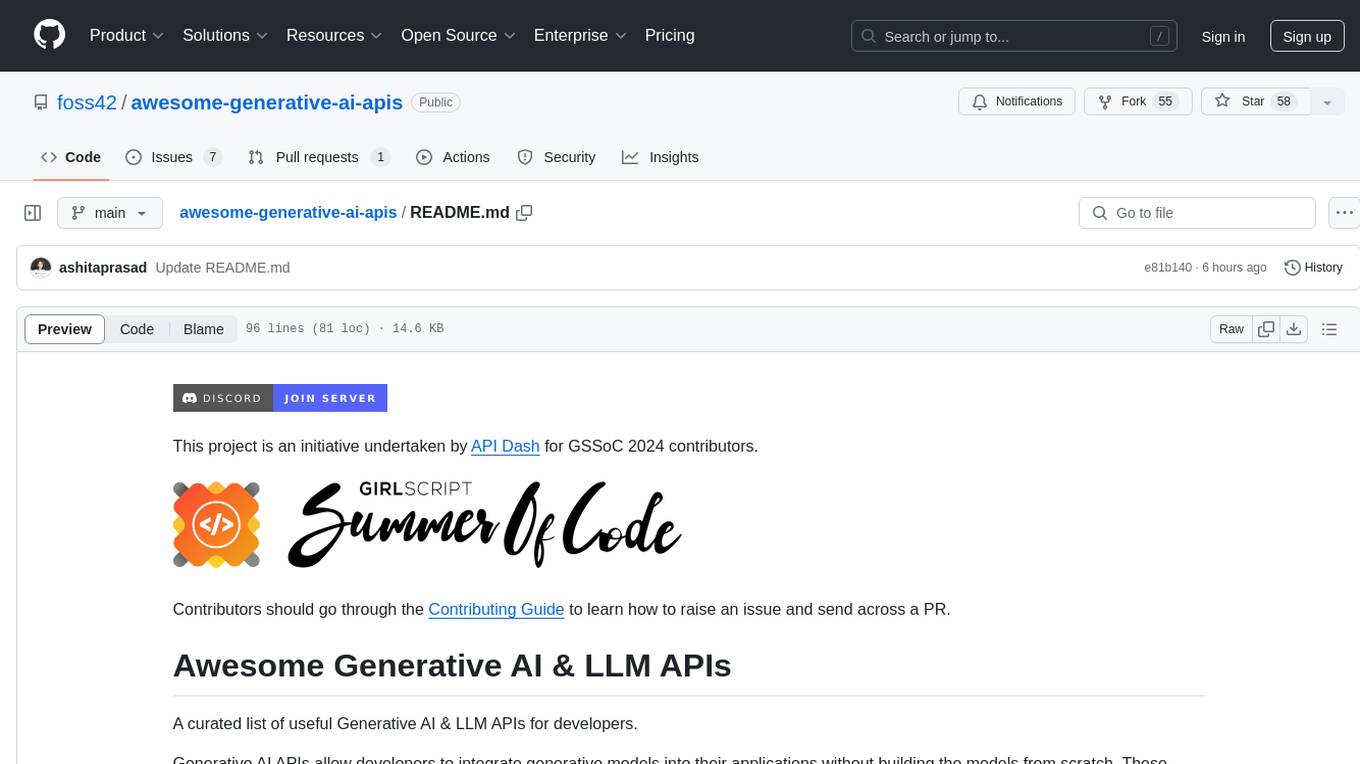
awesome-generative-ai-apis
Awesome Generative AI & LLM APIs is a curated list of useful APIs that allow developers to integrate generative models into their applications without building the models from scratch. These APIs provide an interface for generating text, images, or other content, and include pre-trained language models for various tasks. The goal of this project is to create a hub for developers to create innovative applications, enhance user experiences, and drive progress in the AI field.
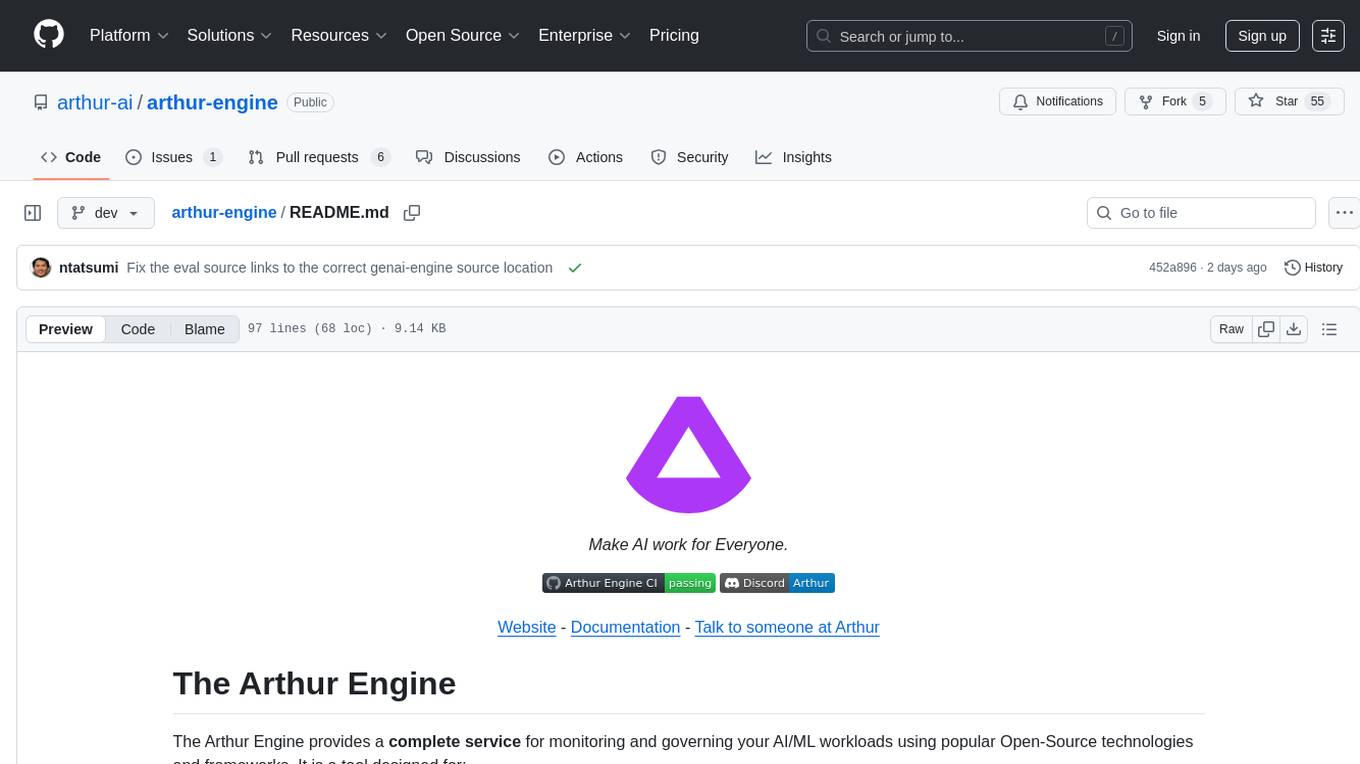
arthur-engine
The Arthur Engine is a comprehensive tool for monitoring and governing AI/ML workloads. It provides evaluation and benchmarking of machine learning models, guardrails enforcement, and extensibility for fitting into various application architectures. With support for a wide range of evaluation metrics and customizable features, the tool aims to improve model understanding, optimize generative AI outputs, and prevent data-security and compliance risks. Key features include real-time guardrails, model performance monitoring, feature importance visualization, error breakdowns, and support for custom metrics and models integration.
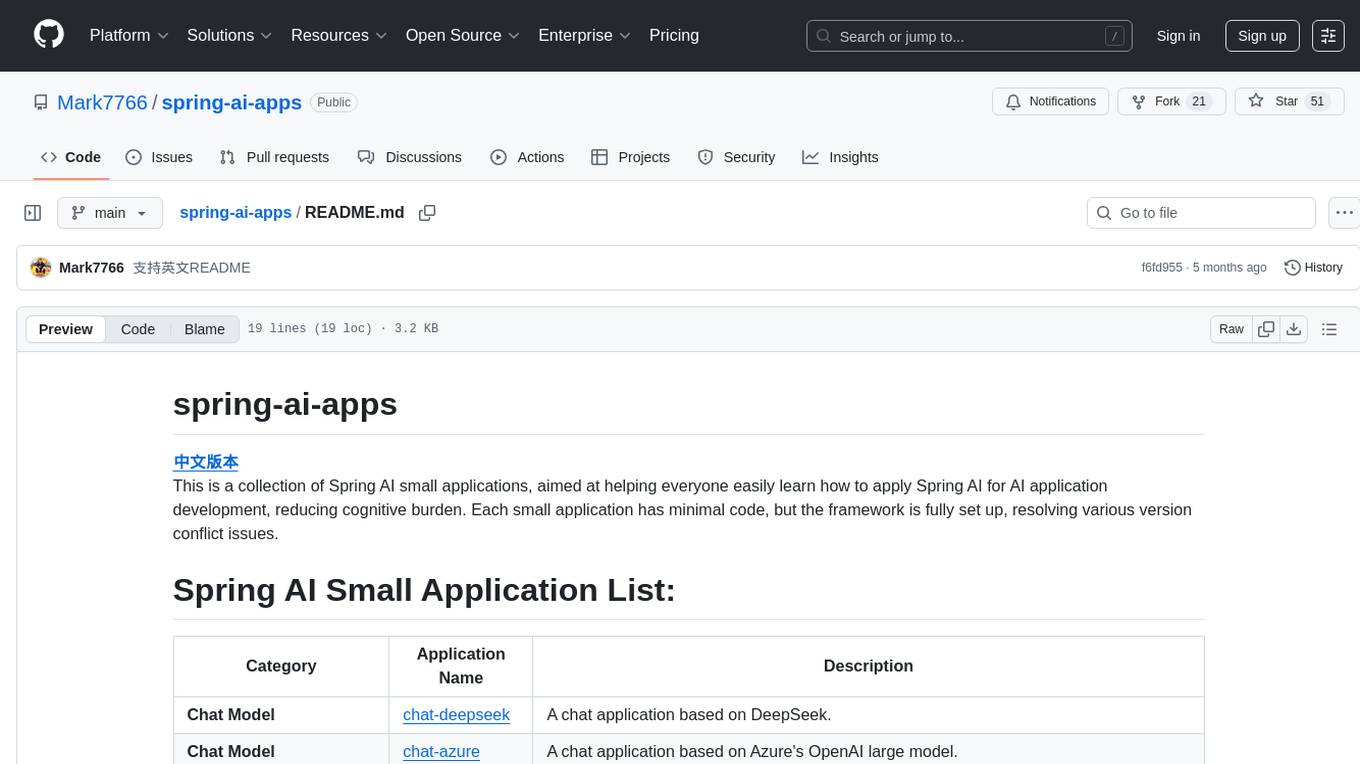
spring-ai-apps
spring-ai-apps is a collection of Spring AI small applications designed to help users easily apply Spring AI for AI application development. Each small application comes with minimal code and a fully set up framework to resolve version conflict issues.

aitour-interact-with-llms
This repository is for the AI Tour workshop: Interacting with Multimodal models in Azure AI Foundry. The workshop provides a hands-on introduction to core concepts and best practices for interacting with OpenAI models in Azure AI Foundry portal. Participants can innovate with Azure OpenAI's GPT-4o multimodal model to generate text, sound, and images using GPT-4o-mini, DALL-E, and GPT-4o-realtime. The workshop also covers creating AI Agents to enhance user experiences and drive innovation. It includes instructions, resources for continued learning, and information on responsible AI practices.
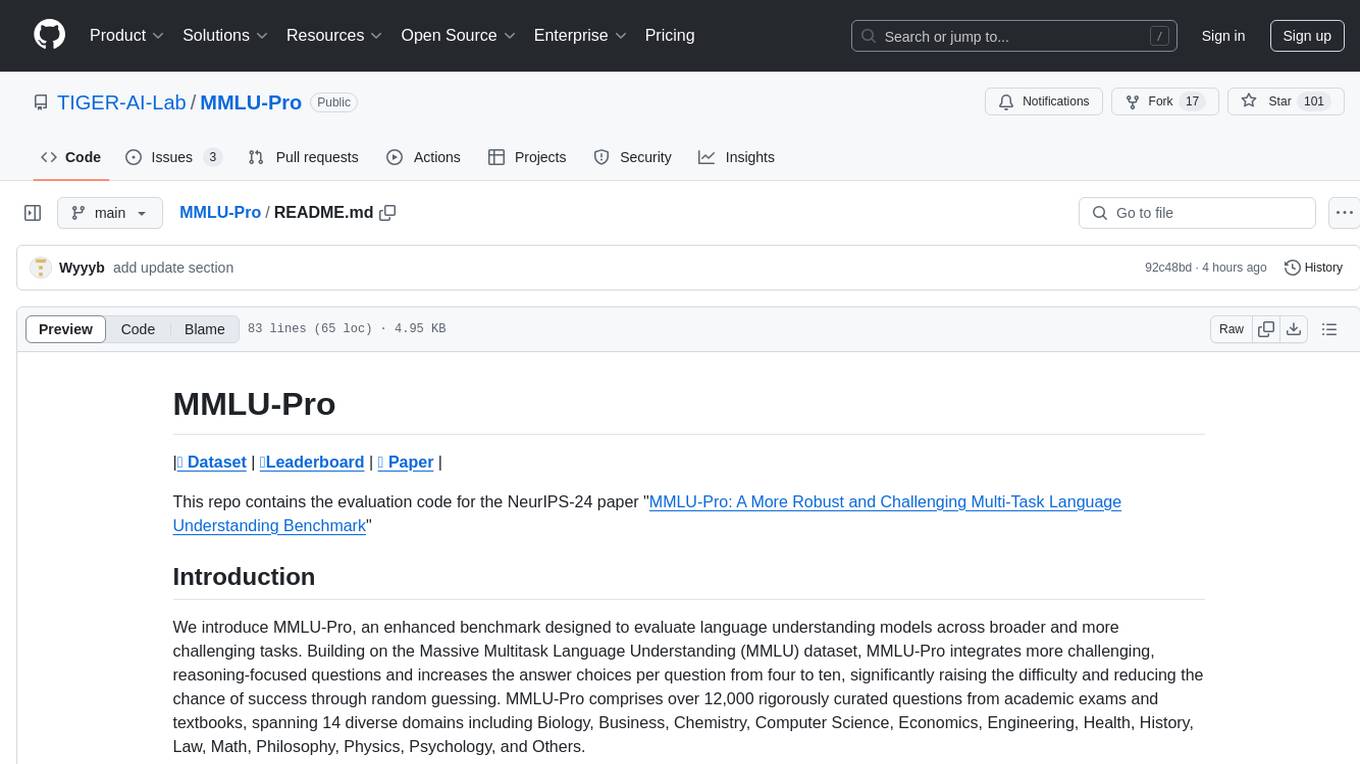
MMLU-Pro
MMLU-Pro is an enhanced benchmark designed to evaluate language understanding models across broader and more challenging tasks. It integrates more challenging, reasoning-focused questions and increases answer choices per question, significantly raising difficulty. The dataset comprises over 12,000 questions from academic exams and textbooks across 14 diverse domains. Experimental results show a significant drop in accuracy compared to the original MMLU, with greater stability under varying prompts. Models utilizing Chain of Thought reasoning achieved better performance on MMLU-Pro.
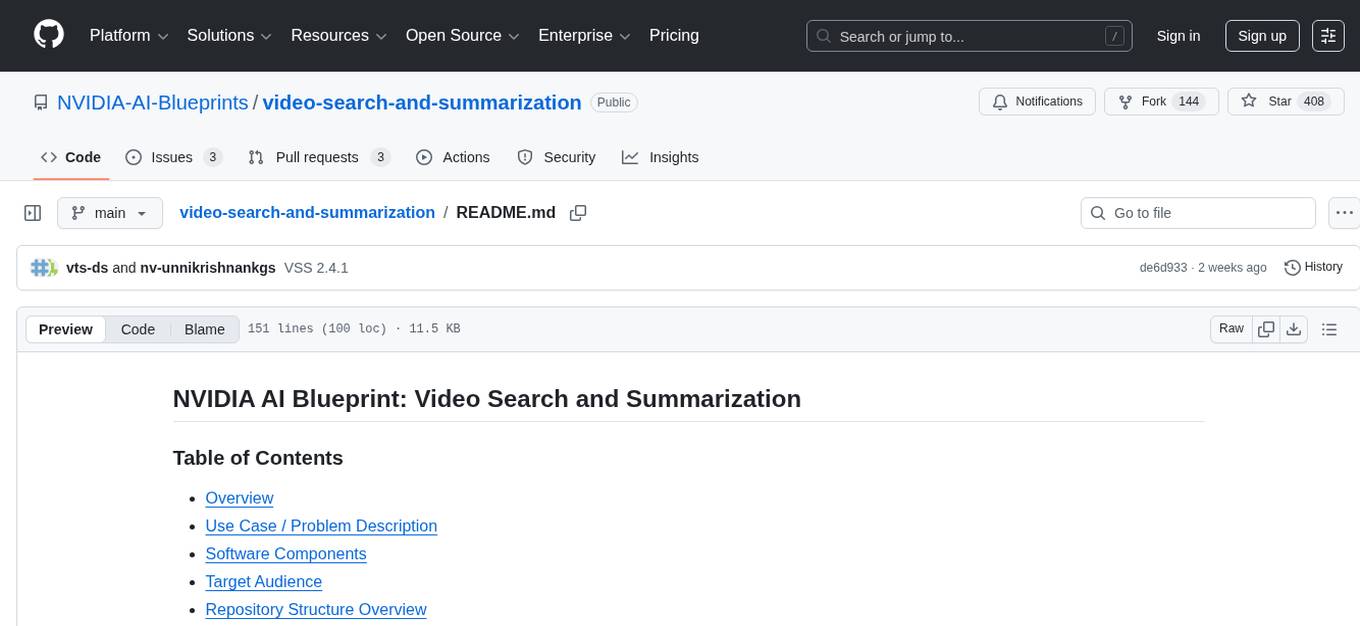
video-search-and-summarization
The NVIDIA AI Blueprint for Video Search and Summarization is a repository showcasing video search and summarization agent with NVIDIA NIM microservices. It enables industries to make better decisions faster by providing insightful, accurate, and interactive video analytics AI agents. These agents can perform tasks like video summarization and visual question-answering, unlocking new application possibilities. The repository includes software components like NIM microservices, ingestion pipeline, and CA-RAG module, offering a comprehensive solution for analyzing and summarizing large volumes of video data. The target audience includes video analysts, IT engineers, and GenAI developers who can benefit from the blueprint's 1-click deployment steps, easy-to-manage configurations, and customization options. The repository structure overview includes directories for deployment, source code, and training notebooks, along with documentation for detailed instructions. Hardware requirements vary based on deployment topology and dependencies like VLM and LLM, with different deployment methods such as Launchable Deployment, Docker Compose Deployment, and Helm Chart Deployment provided for various use cases.
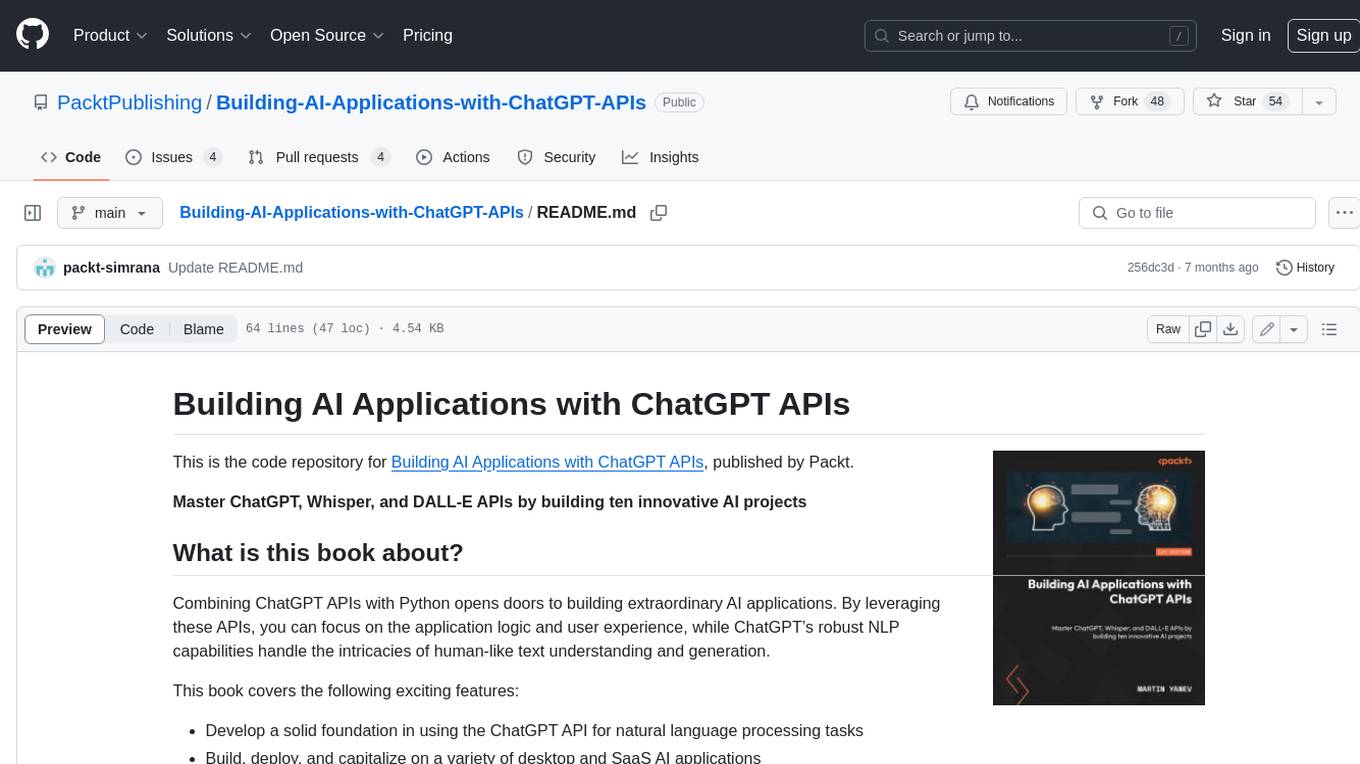
Building-AI-Applications-with-ChatGPT-APIs
This repository is for the book 'Building AI Applications with ChatGPT APIs' published by Packt. It provides code examples and instructions for mastering ChatGPT, Whisper, and DALL-E APIs through building innovative AI projects. Readers will learn to develop AI applications using ChatGPT APIs, integrate them with frameworks like Flask and Django, create AI-generated art with DALL-E APIs, and optimize ChatGPT models through fine-tuning.
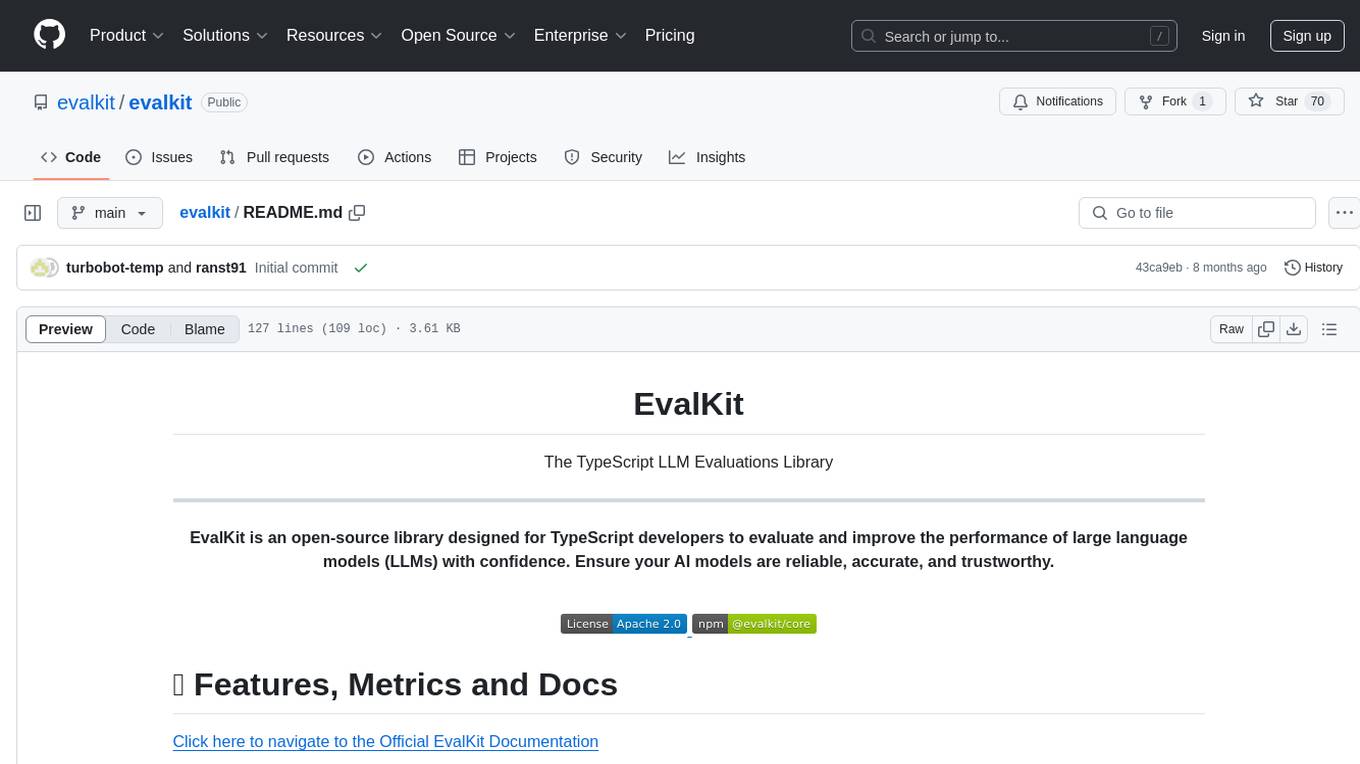
evalkit
EvalKit is an open-source TypeScript library for evaluating and improving the performance of large language models (LLMs). It helps developers ensure the reliability, accuracy, and trustworthiness of their AI models. The library provides various metrics such as Bias Detection, Coherence, Faithfulness, Hallucination, Intent Detection, and Semantic Similarity. EvalKit is designed to be user-friendly with detailed documentation, tutorials, and recipes for different use cases and LLM providers. It requires Node.js 18+ and an OpenAI API Key for installation and usage. Contributions from the community are welcome under the Apache 2.0 License.
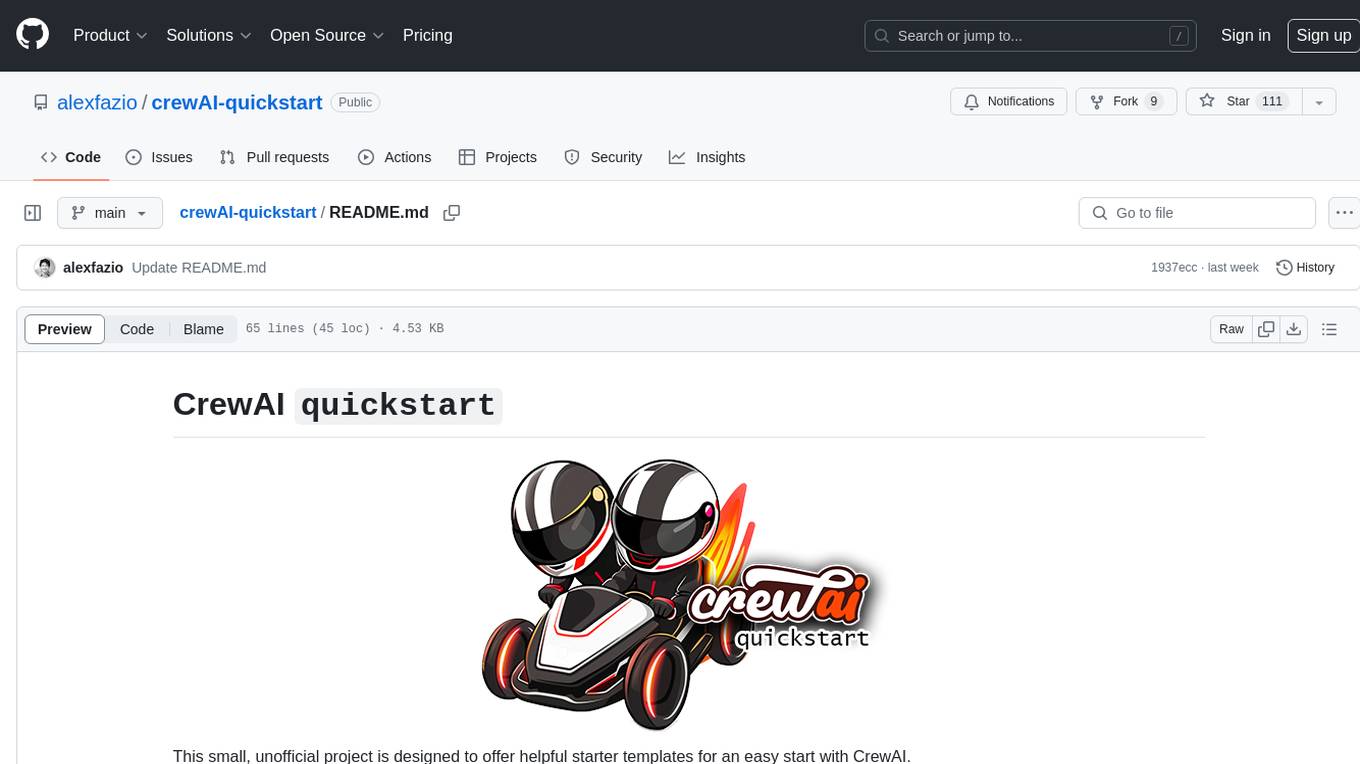
crewAI-quickstart
CrewAI quickstart is a small project providing starter templates for an easy start with CrewAI. It includes notebooks, Python scripts, GUI with Streamlit, and Local LLMs for various tasks like web search, CSV lookup, web scraping, PDF search, and more. Contributions are welcome to enhance the project.
For similar tasks

LLMStack
LLMStack is a no-code platform for building generative AI agents, workflows, and chatbots. It allows users to connect their own data, internal tools, and GPT-powered models without any coding experience. LLMStack can be deployed to the cloud or on-premise and can be accessed via HTTP API or triggered from Slack or Discord.

ai-guide
This guide is dedicated to Large Language Models (LLMs) that you can run on your home computer. It assumes your PC is a lower-end, non-gaming setup.

onnxruntime-genai
ONNX Runtime Generative AI is a library that provides the generative AI loop for ONNX models, including inference with ONNX Runtime, logits processing, search and sampling, and KV cache management. Users can call a high level `generate()` method, or run each iteration of the model in a loop. It supports greedy/beam search and TopP, TopK sampling to generate token sequences, has built in logits processing like repetition penalties, and allows for easy custom scoring.

jupyter-ai
Jupyter AI connects generative AI with Jupyter notebooks. It provides a user-friendly and powerful way to explore generative AI models in notebooks and improve your productivity in JupyterLab and the Jupyter Notebook. Specifically, Jupyter AI offers: * An `%%ai` magic that turns the Jupyter notebook into a reproducible generative AI playground. This works anywhere the IPython kernel runs (JupyterLab, Jupyter Notebook, Google Colab, Kaggle, VSCode, etc.). * A native chat UI in JupyterLab that enables you to work with generative AI as a conversational assistant. * Support for a wide range of generative model providers, including AI21, Anthropic, AWS, Cohere, Gemini, Hugging Face, NVIDIA, and OpenAI. * Local model support through GPT4All, enabling use of generative AI models on consumer grade machines with ease and privacy.

khoj
Khoj is an open-source, personal AI assistant that extends your capabilities by creating always-available AI agents. You can share your notes and documents to extend your digital brain, and your AI agents have access to the internet, allowing you to incorporate real-time information. Khoj is accessible on Desktop, Emacs, Obsidian, Web, and Whatsapp, and you can share PDF, markdown, org-mode, notion files, and GitHub repositories. You'll get fast, accurate semantic search on top of your docs, and your agents can create deeply personal images and understand your speech. Khoj is self-hostable and always will be.

langchain_dart
LangChain.dart is a Dart port of the popular LangChain Python framework created by Harrison Chase. LangChain provides a set of ready-to-use components for working with language models and a standard interface for chaining them together to formulate more advanced use cases (e.g. chatbots, Q&A with RAG, agents, summarization, extraction, etc.). The components can be grouped into a few core modules: * **Model I/O:** LangChain offers a unified API for interacting with various LLM providers (e.g. OpenAI, Google, Mistral, Ollama, etc.), allowing developers to switch between them with ease. Additionally, it provides tools for managing model inputs (prompt templates and example selectors) and parsing the resulting model outputs (output parsers). * **Retrieval:** assists in loading user data (via document loaders), transforming it (with text splitters), extracting its meaning (using embedding models), storing (in vector stores) and retrieving it (through retrievers) so that it can be used to ground the model's responses (i.e. Retrieval-Augmented Generation or RAG). * **Agents:** "bots" that leverage LLMs to make informed decisions about which available tools (such as web search, calculators, database lookup, etc.) to use to accomplish the designated task. The different components can be composed together using the LangChain Expression Language (LCEL).

danswer
Danswer is an open-source Gen-AI Chat and Unified Search tool that connects to your company's docs, apps, and people. It provides a Chat interface and plugs into any LLM of your choice. Danswer can be deployed anywhere and for any scale - on a laptop, on-premise, or to cloud. Since you own the deployment, your user data and chats are fully in your own control. Danswer is MIT licensed and designed to be modular and easily extensible. The system also comes fully ready for production usage with user authentication, role management (admin/basic users), chat persistence, and a UI for configuring Personas (AI Assistants) and their Prompts. Danswer also serves as a Unified Search across all common workplace tools such as Slack, Google Drive, Confluence, etc. By combining LLMs and team specific knowledge, Danswer becomes a subject matter expert for the team. Imagine ChatGPT if it had access to your team's unique knowledge! It enables questions such as "A customer wants feature X, is this already supported?" or "Where's the pull request for feature Y?"

infinity
Infinity is an AI-native database designed for LLM applications, providing incredibly fast full-text and vector search capabilities. It supports a wide range of data types, including vectors, full-text, and structured data, and offers a fused search feature that combines multiple embeddings and full text. Infinity is easy to use, with an intuitive Python API and a single-binary architecture that simplifies deployment. It achieves high performance, with 0.1 milliseconds query latency on million-scale vector datasets and up to 15K QPS.
For similar jobs

ChatFAQ
ChatFAQ is an open-source comprehensive platform for creating a wide variety of chatbots: generic ones, business-trained, or even capable of redirecting requests to human operators. It includes a specialized NLP/NLG engine based on a RAG architecture and customized chat widgets, ensuring a tailored experience for users and avoiding vendor lock-in.

agentcloud
AgentCloud is an open-source platform that enables companies to build and deploy private LLM chat apps, empowering teams to securely interact with their data. It comprises three main components: Agent Backend, Webapp, and Vector Proxy. To run this project locally, clone the repository, install Docker, and start the services. The project is licensed under the GNU Affero General Public License, version 3 only. Contributions and feedback are welcome from the community.

anything-llm
AnythingLLM is a full-stack application that enables you to turn any document, resource, or piece of content into context that any LLM can use as references during chatting. This application allows you to pick and choose which LLM or Vector Database you want to use as well as supporting multi-user management and permissions.

ai-guide
This guide is dedicated to Large Language Models (LLMs) that you can run on your home computer. It assumes your PC is a lower-end, non-gaming setup.

Magick
Magick is a groundbreaking visual AIDE (Artificial Intelligence Development Environment) for no-code data pipelines and multimodal agents. Magick can connect to other services and comes with nodes and templates well-suited for intelligent agents, chatbots, complex reasoning systems and realistic characters.

glide
Glide is a cloud-native LLM gateway that provides a unified REST API for accessing various large language models (LLMs) from different providers. It handles LLMOps tasks such as model failover, caching, key management, and more, making it easy to integrate LLMs into applications. Glide supports popular LLM providers like OpenAI, Anthropic, Azure OpenAI, AWS Bedrock (Titan), Cohere, Google Gemini, OctoML, and Ollama. It offers high availability, performance, and observability, and provides SDKs for Python and NodeJS to simplify integration.

chatbot-ui
Chatbot UI is an open-source AI chat app that allows users to create and deploy their own AI chatbots. It is easy to use and can be customized to fit any need. Chatbot UI is perfect for businesses, developers, and anyone who wants to create a chatbot.

onnxruntime-genai
ONNX Runtime Generative AI is a library that provides the generative AI loop for ONNX models, including inference with ONNX Runtime, logits processing, search and sampling, and KV cache management. Users can call a high level `generate()` method, or run each iteration of the model in a loop. It supports greedy/beam search and TopP, TopK sampling to generate token sequences, has built in logits processing like repetition penalties, and allows for easy custom scoring.
